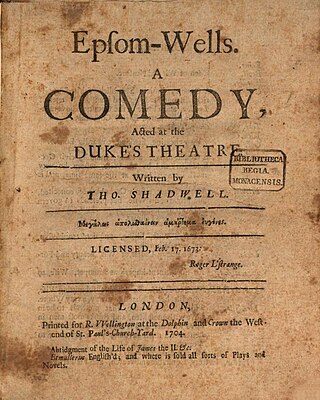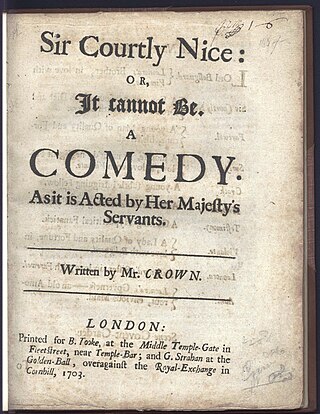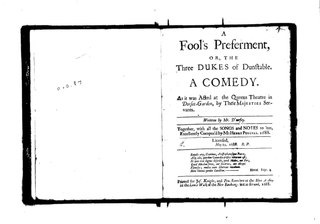Related Research Articles
The Royalist is a 1682 comedy play by the English writer Thomas D'Urfey. It was staged at the Dorset Garden Theatre by the Duke's Company, shortly before the merger that created the United Company. It is set during the Commonwealth Era following the English Civil War.
The Sullen Lovers; Or, The Impertinents is a 1668 comedy play by the English writer Thomas Shadwell, inspired by Molière's Les Fâcheux. It was staged by the Duke's Company at the Lincoln's Inn Fields Theatre in London. The cast included Henry Harris as Sir Positive At-All, James Nokes as Poet Ninny, William Smith as Standford and Edward Angel as Woodcock and Anne Shadwell as Emelia.

Epsom Wells is a 1672 restoration comedy by the English writer Thomas Shadwell. It was the first in a line of plays set in spa towns. The incidental music was composed by Nicholas Staggins. In the 1690s Henry Purcell scored a new staging of the play. It was performed at the Dorset Garden Theatre by the Duke's Company. The cast included Henry Harris as Rains, Thomas Betterton as Bevil, William Smith as Woodly, Cave Underhill as Justice Clodpate, Anne Gibbs as Lucia, Mary Betterton as Mrs Jilt, James Nokes as Bisket and Edward Angel as Fribble.

Lucius or Lucius, the First Christian King of Britain is a 1717 tragedy by the British writer Delarivier Manley. It is based on the life of Lucius of Britain, the second century ruler of Britain traditionally considered to have introduced Christianity to Britain. It was Manley's final play to be staged.

The Cobbler of Preston is a 1716 comedy play by Christopher Bullock, although a separate play of the same title was written by Charles Johnson the same year. A one-act afterpiece is the origin of the phrase "Tis impossible to be sure of anything but Death and Taxes". In the preface to the published version Bullock suggested that he had begun writing the play just four days before its premiere. It takes inspiration from The Taming of the Shrew by William Shakespeare and is set in Preston, Lancashire. The town had recently been scene of fighting during the 1715 Jacobite Rebellion at the Battle of Preston. Bullock's play does not overtly reference the rebellion, but has undertones supportive of the Hanoverian Dynasty.
Adventures in Madrid or The Adventures in Madrid is a 1706 comedy play by the English writer Mary Pix. It was her final staged work.
The Contrivances is a 1715 comedy play by the British writer Henry Carey. A farce, it produced was an afterpiece to follow on from a revival of Bonduca.

The Double Gallant is a 1707 comedy play by the British writer Colley Cibber.

The Rival Fools is a 1709 comedy play by the British writer Colley Cibber. It drew inspiration from the earlier play Wit at Several Weapons. Despite Cibber's previous record of turning out hits, it was not a great success.
Appius and Virginia is a 1709 tragedy by the British writer John Dennis. It was a distinct reworking by Dennis of an older play of the same title by John Webster. It was not a particular success on its debut. It became best known for Dennis' use of an innovative new technique to imitate the sound of thunder. When Dennis' play was taken off and a revival of Macbeth put off, he was angered when he attended a performance and discovered they were using his thunder machine, reportedly exclaiming "they will not let my play run, and yet they steal my thunder". This gave rise to the expression "stealing thunder".

Sir Courtly Nice: Or, It Cannot Be is a 1685 comedy play by the English writer John Crowne. Rehearsals by the United Company were underway when the death of Charles II in February led to the closure of all theatres as a mark of respect. The play was eventually staged on 9 May at the Theatre Royal, Drury Lane. It is the tradition of the Restoration Comedy. A popular hit it became a stock part of the repertoire for more than a century, with Colley Cibber and Anne Oldfield appearing in a celebrated 1709 revival.
The Adventures of Five Hours is a 1663 comedy play by the English writer Sir Samuel Tuke, 1st Baronet. Based on the play Los empenos de seis horas by Antonio Coello, It is an early example of the developing Restoration comedy tradition. Its success led to a series of sentimental plays in the Spanish style about love and honour, very different to the more sophisticated and cynical comedies which the Restoration era became known for.

A Fond Husband; Or, The Plotting Sisters also known as The Fond Husband is a 1677 comedy play by the English writer Thomas D'Urfey. It was first staged by the Duke's Company at London's Dorset Garden Theatre with a cast that included William Smith as Rashley, Henry Harris as Ranger, James Nokes as Peregrine Bubble, Anthony Leigh as Old Fumble, Samuel Sandford as Sir Roger Petulant, Thomas Jevon as Sneak, John Richards as Spatterdash, Thomas Percival as Apothecary, Elizabeth Barry as Emillia, Rebecca Marshall as Maria and Margaret Hughes as Cordelia. The published version was dedicated to the Irish statesman James Butler, Duke of Ormonde.
The Woman Captain; Or, The Usurer Turned Soldier is a 1679 comedy by the English writer Thomas Shadwell. It was originally staged by the Duke's Company at Dorset Garden Theatre in London. The original cast is unknown except for Elizabeth Barry who played the title role, and also read the epilogue. It is part of the tradition of Restoration Comedy that flourished during the era.

Bury Fair is a 1689 comedy play by the English writer Thomas Shadwell. It is part of the tradition of Restoration Comedy that flourished during the era. It was first staged by the United Company at the Theatre Royal, Drury Lane in London.

Love In The Dark; Or, The Man of Bus'ness is a 1675 comedy play by the English writer Francis Fane. It was first staged by the King's Company at the Theatre Royal, Drury Lane in London. The epilogue was written by the Earl of Rochester, and may also have contributed some of the more libertine lines to the play. It is set in Venice.

A Fool's Preferment; Or, The Three Dukes Of Dunstable is a 1688 comedy play by the English writer Thomas D'Urfey. It is a reworking of John Fletcher's Jacobean work The Noble Gentleman. It was first performed by the United Company at the Dorset Garden Theatre in London. Henry Purcell composed the play's incidental music. It was his first major work composing for the theatre in seven years since Sir Barnaby Whigg.
The Lying Lover; Or, The Lady's Friendship is a 1703 comedy play by the Irish writer Richard Steele. It was his second play, written while he was an army office doing garrison duty in Harwich during the War of the Spanish Succession. It is described as being both a restoration comedy and a sentimental comedy, and marked the transition between the two.
Lewis Maidwell (1650–1716) was an English writer and educator.

Sir Salomon; Or, The Cautious Coxcomb is a 1670 comedy play by the English writer John Caryll. It has often been staged under the title Sir Solomon Single. It was first performed by the Duke's Company at the Lincoln's Inn Fields Theatre in London. It is part of the tradition of Restoration comedy.